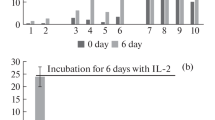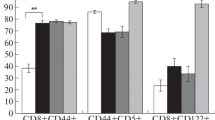Abstract
We previously reported [Chakrabarti et al. (1992) Cell Immunol 142:54; 144:455] that, in a murine B lymphoma model 2C3, idiotype (Id)-specific CD8+ cytotoxic T lymphocytes (CTL) are generated in mice following hyperimmunization with irradiated tumor cells, and that they are effective in tumor rejection. The present study reveals that 2C3-specific CTL are also induced in spleens during tumor progression, but are not sustained. At the early stage of tumor growth, the splenic T cells following a 5-day incubation in vitro with killed 2C3 tumor targets, produce high levels of cytokines, namely interleukin-4 (IL-4), IL-10 and interferon γ (IFNγ). Their cytotoxic T lymphocyte (CTL) activity and cytokine levels, except IL-2, sharply decline at the late stage when the mice are increasingly moribund. Although the decline in cytokine level is also evident with CD4+ T cells, a precipitous and concurrent decrease occurs primarily in the IL-4 level with both CD4+ and CD8+ T cells of late-tumor-bearing animals (TBA). Study with the unseparated splenocytes also reveals that sevenfold less IL-4 is produced at the late stage. Furthermore, the cytotoxicity of CTL from late TBA can be effectively restored by addition of supernatants from the splenocyte culture of early TBA, or by IL-4, but not by IFNγ and IL-10. In addition, only IL-4-activated CD8+ T cells from the late TBA are found, by Winn assay, to be protective in vivo. Thus it appears that IL-4, required to sustain antitumor CTL activity, is consumed by T and possibly other cells at the late stage of tumor growth, thereby compromising host immunity against the tumor. We contend that induction or maintenance of protective immunity depends not only on the tumor antigen but also on the specific cytokine milieu in a tumor-bearing host.
Similar content being viewed by others
Author information
Authors and Affiliations
Additional information
Received: 8 February 1997 / Accepted: 24 April 1997
Rights and permissions
About this article
Cite this article
Santra, S., Ghosh, S. Interleukin-4 is effective in restoring cytotoxic T cell activity that declines during in vivo progression of a murine B lymphoma. Cancer Immunol Immunother 44, 291–300 (1997). https://doi.org/10.1007/s002620050385
Issue Date:
DOI: https://doi.org/10.1007/s002620050385




